On the day of the international recognition of the Republic of Croatia a third of…
We were soldiers of the Croatian Army
Three British volunteers of the Homeland War, Daniel Kington, Lars Newbould and Dr. Martin G.Parry were the special guests at a ceremony marking the anniversary of Operation Storm. They came to Croatia in the early days of the Homeland War, alongside a number of other foreign volunteers, despite having no previous connection with the country. Joining the newly established military units of the Croatian Armed Forces, they ventured into the war. Their recollections of that time and the emotions remain vivid. Modestly reiterating that they did nothing special, their presence in Croatia came at a time when the country needed it most, hence their valour and importance. Today, they can say with immense pride that they were soldiers of the Croatian Army. It was an great feeling – and a privilege!
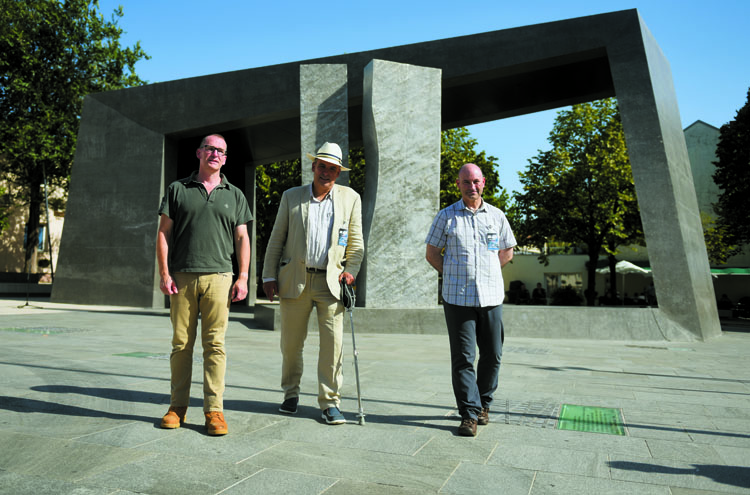
This year’s commemoration of Operation Storm was especially emotional for three Croatian war veterans, reviving their dormant memories and imbuing them with a sense of great pride. This year’s event would perhaps be nothing in particular, were it not for the presence of three British volunteers of the Homeland War: Daniel Kington, Lars Newbould and Dr. Martin Parry who, in the 1990’s joined the Croatian military alongside hundreds of other foreign volunteers, and who were honoured as special guests at this year’s ceremony marking the nation’s Day of Victory. At the time Operation Storm was launched the three had already been demobilised and returned to the UK but their hearts seem to have remained in Croatia. When the media started covering the situation in Croatia and the victories of the Croatian Army, for Daniel it was one of the strongest sensations he had ever experienced – a feeling of immense pride, happiness and satisfaction. “I felt like a father whose son had just attained his doctorate. I was once a part of that military force and watching it advance swiftly to victory was a unique sentiment.“ Daniel had followed developments within the Croatian Army during that period and was unsurprised to learn of the operations that paved the way to Flash and Storm a few months later.
“However, Operation Storm was an extraordinary and impeccably executed campaign, as if conducted by a western professional Army. I was frankly ecstatic, happy and proud to know the people responsible and certain in their abilities to achieve that kind of victory. Watching the Croatian Army’s progress and later, the educational secondment of Croatian officers to the United Kingdom and the engagement of the Croatian Armed Forces in international missions, I was convinced Croatia would enter NATO. When it happened, I knew that my beautiful Croatia would be forever safe“.
Lars described his enthusiasm upon seeing the first reports of Operation Storm on TV, which were albeit brief and only partially unbiased and he appreciated from his experiences in earlier years that the media were capable of distorting the facts and prone to denigrating the Croatian Army, which frustrated him. “I exclaimed, ‘Yes! But why am I not there?’ I was proud to have worn the same uniform that I now saw on TV, to have been with those soldiers in combat, making friendships with those brave young men and women. I remember saying, ‘Finally, after all they have been through, Croatia and the Croatian Army have succeeded’“.
It was very touching to listen to them speak openly and almost ecstatically, as if they were still the same young men who in 1991 enthusiastically joined in an unrepeatable war story that would change them forever.
We felt an incredible togetherness and were convinced Croatia would win
Our three interviewees were among the first foreign volunteers to arrive in Croatia, despite having had no previous connection with the country. Joining the newly established military units of the Croatian Armed Forces, they ventured into the war. Despite a mass of distorted information in the foreign media, they sensed where the truth really lay and felt an irresistible inner calling to go and help, to join the righteous struggle of a small nation for its liberty and independence. Their next stop was inevitably Croatia. 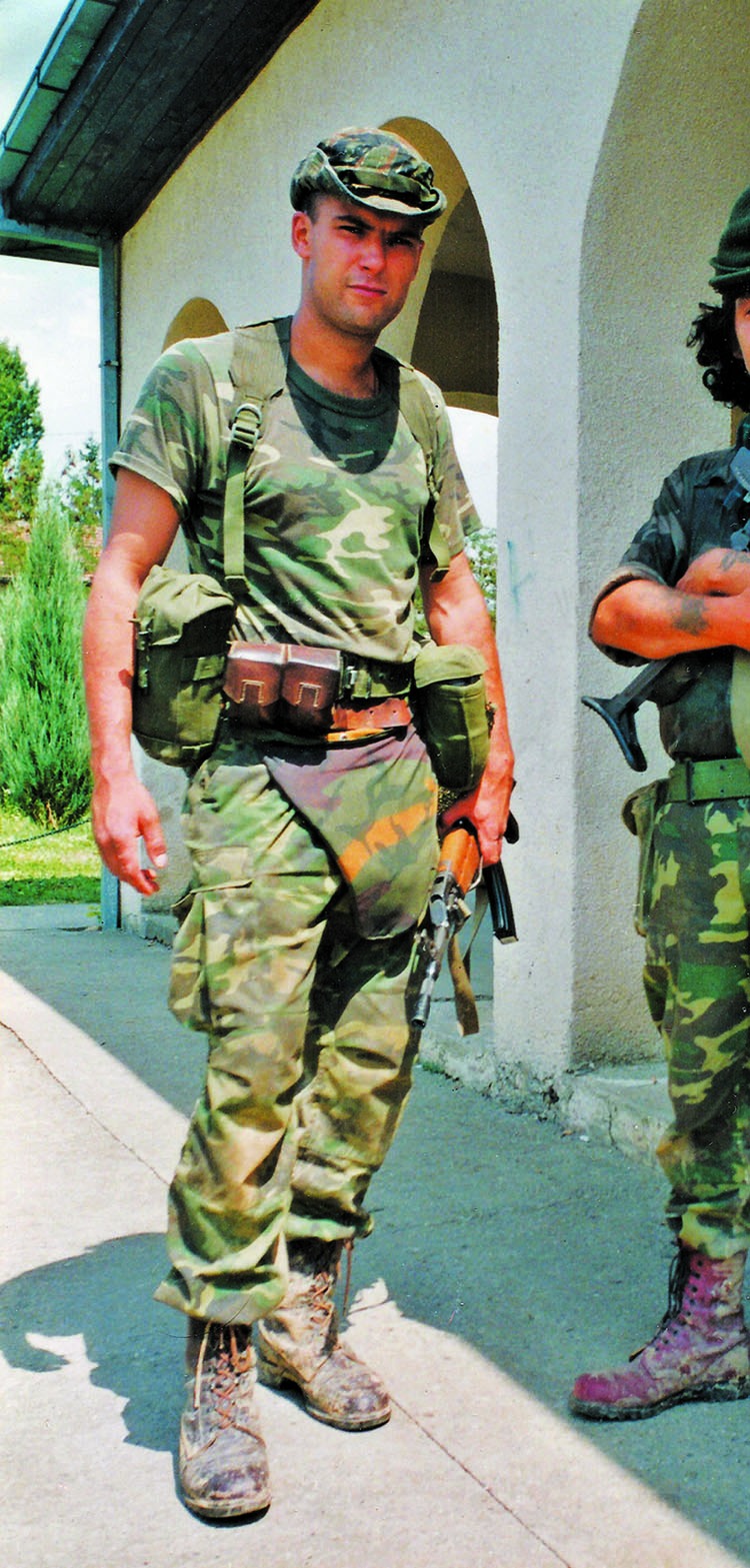 During his stay in Taiwan, English teacher Lars Newbould followed the worsening situation in Croatia, as well as the lack of interest and understanding from the idle political élites, reading the reports appearing in the Bangkok Post, South China Morning Post and Taipei News. What brought the 25-year old to join the Croatian Army is not difficult to explain. He said he was ashamed with the conduct of the important figures in his country, who seemed determined not to understand the situation in Croatia whilst everybody else did. The British media seemed to be depicting the situation with a bias against Croatia. Lars could not bear it and wanted to show that there were people who thought otherwise and clearly understood the situation; that some actually supported Croatia and wanted to help and he knew he was not the only one. Meeting a Croatian dancer in Taiwan was a decisive moment for him; with the financial assistance of the Croatian girl, Lars and a friend made the long trip overland from Hong Kong and a month later were in Zagreb. Upon arrival and asking where the worst fighting was, he learned that it was in an area of the eastern Slavonian town of Vinkovci known as “Mala Bosna“. He and his friend made it there shortly after the besieged town of Vukovar fell. The only units still accepting foreigners were the Croatian Defence Forces (HOS), with whom Lars spent several months on the battlefield at Mala Bosna. He had no military experience except what he had learned from his father about various weapons. He remembers receiving a M48 rifle, based on the German-made K98 that he had first seen when he was five and not believing that twenty years on he was holding an obsolete model from the last world war. He emphasised however that he knew of Croatia’s difficulties with the procurement of arms and understood who was partly responsible. With an ironic smile, he explained that the words “Maybe tomorrow“ were the first Croatian words he learned, amidst the shortage of arms and other essential items. Nevertheless, he and his fellow combatants learned fast, adapting to their situation and making friendships that last to this day. After a few months, Lars left Vinkovci and joined the Croatian Defence Council (HVO) in the Posavina pocket in northern Bosnia.
During his stay in Taiwan, English teacher Lars Newbould followed the worsening situation in Croatia, as well as the lack of interest and understanding from the idle political élites, reading the reports appearing in the Bangkok Post, South China Morning Post and Taipei News. What brought the 25-year old to join the Croatian Army is not difficult to explain. He said he was ashamed with the conduct of the important figures in his country, who seemed determined not to understand the situation in Croatia whilst everybody else did. The British media seemed to be depicting the situation with a bias against Croatia. Lars could not bear it and wanted to show that there were people who thought otherwise and clearly understood the situation; that some actually supported Croatia and wanted to help and he knew he was not the only one. Meeting a Croatian dancer in Taiwan was a decisive moment for him; with the financial assistance of the Croatian girl, Lars and a friend made the long trip overland from Hong Kong and a month later were in Zagreb. Upon arrival and asking where the worst fighting was, he learned that it was in an area of the eastern Slavonian town of Vinkovci known as “Mala Bosna“. He and his friend made it there shortly after the besieged town of Vukovar fell. The only units still accepting foreigners were the Croatian Defence Forces (HOS), with whom Lars spent several months on the battlefield at Mala Bosna. He had no military experience except what he had learned from his father about various weapons. He remembers receiving a M48 rifle, based on the German-made K98 that he had first seen when he was five and not believing that twenty years on he was holding an obsolete model from the last world war. He emphasised however that he knew of Croatia’s difficulties with the procurement of arms and understood who was partly responsible. With an ironic smile, he explained that the words “Maybe tomorrow“ were the first Croatian words he learned, amidst the shortage of arms and other essential items. Nevertheless, he and his fellow combatants learned fast, adapting to their situation and making friendships that last to this day. After a few months, Lars left Vinkovci and joined the Croatian Defence Council (HVO) in the Posavina pocket in northern Bosnia.
After five months on the battlefield he was allowed his first leave and visited his mother in Trieste, where he had spent part of his childhood. His mother only learned that he had joined the Croatian Army when she saw him being interviewed on TV. He was often saddened by TV reports that had tried to dig the dirt on the Croatian Army whilst he was in combat and not able to see or respond at the time. What he did see and feel however, was that Croatia would one day achieve its’ freedom.
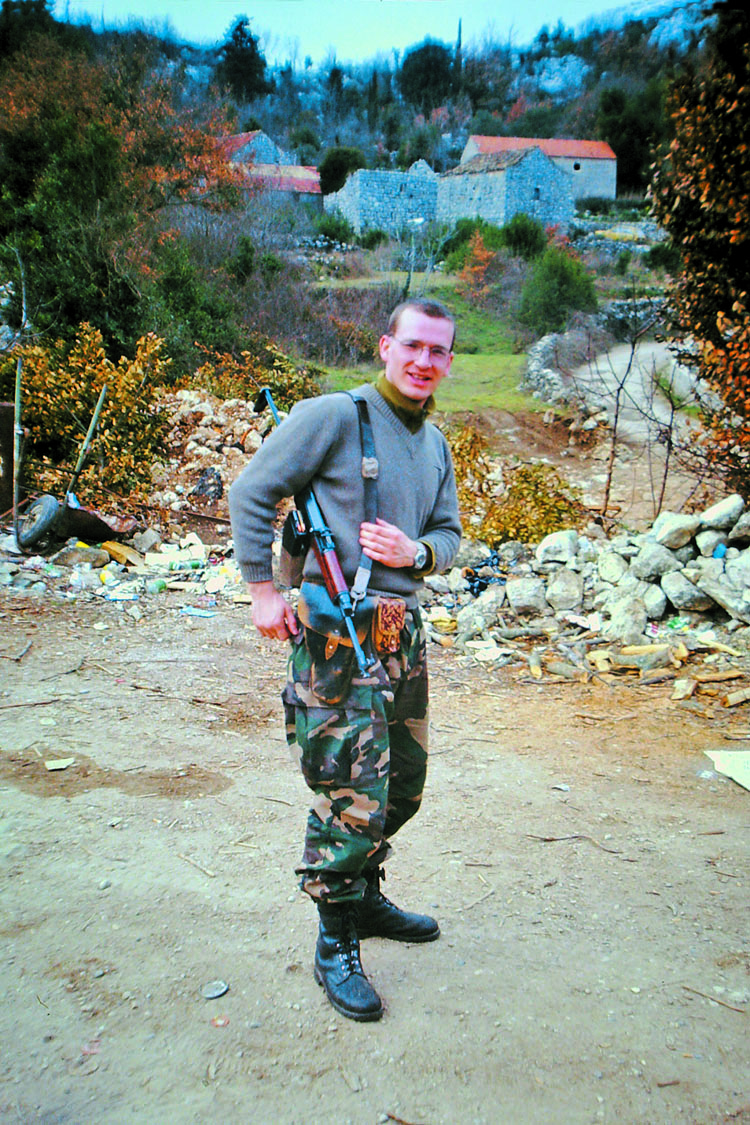 In 1991, Martin G. Parry was working as medical doctor, an anesthesiologist, in a London hospital. By chance he was working alongside a German doctor whose father was of Croatian origin and lived in Split. They delivered supplies to Croatia in the early days of war. His colleague eventually left to join the Croatian military medical services but Martin soon heard from him again, when his colleague asked if he would be prepared to join Croatian Army, which was short of doctors and Martin readily accepted. He arrived at Split in early 1992 and was assigned to the famous 4th Guards Brigade, received a uniform and weapon and followed the fast pace of events. Martin was posted with soldiers of the Spiders to the war’s southern sector for his first combat mission. And he still vividly remembers the locations where he was deployed – the emergency hospitals at Imotica, Topolo and Livno. On several occasions he also assisted in the main hospital in Split. After a short time spent in the UK undergoing specialist training, in September 1992 Martin was back in Split. He recalled that his family were not happy with his decision, but nevertheless understood his motivation to be where people most needed his help. To this day, Martin admires the immense sacrifice and humanity demonstrated by the soldiers, nurses and doctors saving the wounded Croatian defenders of their Homeland.
In 1991, Martin G. Parry was working as medical doctor, an anesthesiologist, in a London hospital. By chance he was working alongside a German doctor whose father was of Croatian origin and lived in Split. They delivered supplies to Croatia in the early days of war. His colleague eventually left to join the Croatian military medical services but Martin soon heard from him again, when his colleague asked if he would be prepared to join Croatian Army, which was short of doctors and Martin readily accepted. He arrived at Split in early 1992 and was assigned to the famous 4th Guards Brigade, received a uniform and weapon and followed the fast pace of events. Martin was posted with soldiers of the Spiders to the war’s southern sector for his first combat mission. And he still vividly remembers the locations where he was deployed – the emergency hospitals at Imotica, Topolo and Livno. On several occasions he also assisted in the main hospital in Split. After a short time spent in the UK undergoing specialist training, in September 1992 Martin was back in Split. He recalled that his family were not happy with his decision, but nevertheless understood his motivation to be where people most needed his help. To this day, Martin admires the immense sacrifice and humanity demonstrated by the soldiers, nurses and doctors saving the wounded Croatian defenders of their Homeland.
Brothers in Arms
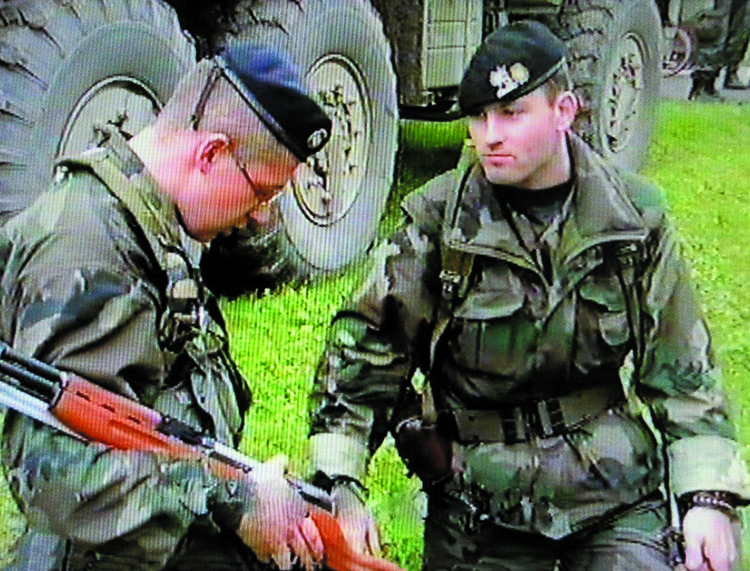 When war broke out in Croatia, Daniel Kington was working as a civil servant in the Department for the Environment. He was 24 at the time and idealistic, believing that each human being is entitled to freedom and each nation to defend its independence.
When war broke out in Croatia, Daniel Kington was working as a civil servant in the Department for the Environment. He was 24 at the time and idealistic, believing that each human being is entitled to freedom and each nation to defend its independence.
The absence of support for the fledgling state of Croatia was apparent to everyone. Croatia had no allies at the time and he wanted to do anything except remain in place and look on helplessly. Daniel told none of his family about his intentions, knowing that they would only try to dissuade him. In October 1991, he secretly arrived in Vienna and then travelled on to Zagreb, where he turned up at the Emigration Information Center and offered his services. He had served three years in the British Army, which proved to be a decisive factor, as the embryonic Croatian military badly needed people with military experience. From the special police barracks at Tuškanac, Daniel was taken to Vinkovci by bus alongside other volunteer soldiers. Only after arrival did he eventually call his father to let him know he was safe, despite a cacophony of explosions and gunfire in the background. He recalls the words of his father; “Dan, do whatever you think you have to do, I know you are doing the right and honourable thing. I am proud of you“. His mother was less happy about it but in time and as Daniel called home regularly, she became calmer and more accepting of his decision to defend Croatia.
The eastern part of Croatia was exposed to the most attacks; Daniel was assigned to the 83rd Independent Zagreb Volunteers’ Battalion defending Nuštar and Vinkovci, before he was soon transferred to the legendary anti-tank platoon the “Desert Rats“ of the 204th Vukovar Brigade of the Croatian National Guard. In an action undertaken in early November during a diversionary raid along the Marinci to Bogdanovci road, his vehicle hit a landmine, killing and wounding the occupants including Daniel. After his evacuation and recovery, Daniel worked as a military instructor, devising programmes and conducting the training of new soldiers. He also remembers instructing whilst on the frontline, giving soldiers useful advice on weapon handling, self-preservation and fieldcraft. “It was gratifying to see the Croatian soldiers take on board our advice. We trained and learned together. We taught them military skills, whilst they taught us their language and culture. We talked about everything, made jokes and became very real and close friends. True Brothers in Arms“.
Many foreign volunteers arrived at the eastern Slavonian battlefields, integratig quickly and successfully into locally-based units. “The level of cohesion among the many different nationalities was amazing“, says Daniel.“ Young soldiers who spoke English reached out to us and were always close when necessary. A few of the older ones were suspicious and distrustful at first but later on, realising that we were genuinely there to fight by their side, they accepted us like brothers and showed the greatest respect and gratitude. They also faced hard and unpredictable times and grieved over fellow combatants who lost their lives. The enduring friendships and connections made in those fateful days reinforced their combined strength. Daniel remembers one episode in Nuštar, in the basement of a house which had lost its first floor while tank shells and mortar bombs were busy destroying the remainder of the building. He recalled his impressions, the expectation of imminent death and the talk about freedom, democracy, the future, of life in general and how similar they all were, despite belonging to different nationalities. “We had known it from the very beginning, on seeing the courage and the faith of the Croatian soldiers, who were citizen soldiers in the truest sense and who were short of food, arms and military skills, that they would win in the end. I didn’t know how, or when it would happen but we could smell victory. I sensed their firm, unbreakable togetherness and was convinced in my heart that Croatia would survive.”
Upon the arrival of UNPROFOR peacekeepers, the UN demanded the demobilisation of all foreign citizens from the Armed Forces of the Republic of Croatia irrespective of the fact that their recruitment was perfectly legal, so that our interviewees were obliged to leave their Croatian units. Lars went on to fight on the Croatian side in Bosnia and Herzegovina, as did a significant number of other international volunteers.
Daniel recalled his return home and the efforts he made to clarify the situation to people around him, having seen the war at first hand. As a foreign combatant in Croatia, he soon caught the attention of the media and despite some attempts to prevent him, he continued to explain his motives and helped to promote the values of the Homeland War imposed upon Croatia. It was a tough time for us, says Lars. “The media called us mercenaries and assassins, while we only wanted to state the plain truth. A question was often asked and it might sound hard to believe, ‘On which side did you fight?’ Unfortunately, many people understood nothing.“
In spite of all this, none of the three is in any doubt that they would do the same again if they found themselves in the same situation. “The experience made us better people, more tolerant, serious, more aware and different. You see both the lowest points in human nature and also unbelievably fantastic highs“.
Remembering their fallen comrades and the hard moments when they said goodbye to each other and all the amazingly brave people they encountered, they conclude, “The experience inevitably changes you“. Although modestly reiterating that they did nothing special, it is enough for us to know that they were present when they were most needed, and this is both their quality and valour. They claim to be merely ordinary people, who had the courage to do an extraordinary thing, once in their lifetimes. Today they proudly affirm, “We were soldiers of the Croatian Army! That is an amazing feeling and a great privilege!“
The largest foreign contingent recruited in Britain
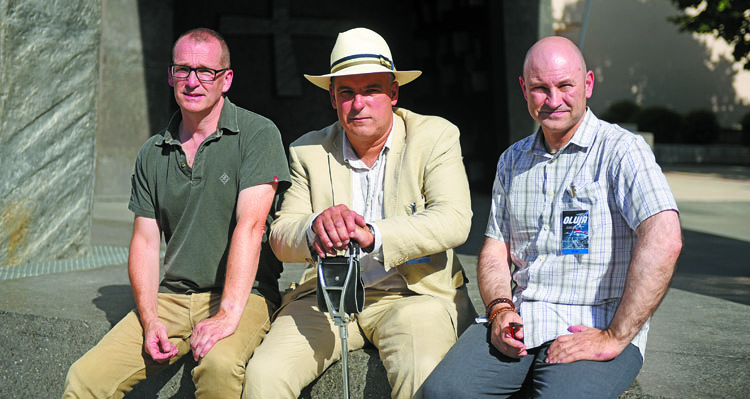 It is difficult to pinpoint the exact number of international volunteers that fought in the ranks of the Croatian Army and Croatian Defence Forces and later on in the Croatian Defence Council, given the varying figures dependent upon the source. From personal accounts and a few online records, the Croatian Forces International Volunteers Association has completed a roll of 597 foreign combatants in Croatian units; they believe however that there were far more, but the various units’ war records have not been accessible and so this figure is still not definitive. According to Daniel’s research, as many as 55 foreign combatants lost their lives in the Homeland War, and with the wars in Bosnia-Herzegovina and Kosovo the toll rose to 122. Currently available data, whilst incomplete, reveals that the international volunteers came from 30 different countries with by far the largest contingent – nearly 200 – from Britain. The largest concentration of international volunteers was in eastern Slavonia, around Vukovar, Vinkovci, Osijek and Nuštar. Eight of them defended Vukovar and three were killed there. The best known among them is the French volunteer Jean-Michel Nicollier, executed at Ovčara and his remains missing to this day. All of them merit a place in Croatian history.
It is difficult to pinpoint the exact number of international volunteers that fought in the ranks of the Croatian Army and Croatian Defence Forces and later on in the Croatian Defence Council, given the varying figures dependent upon the source. From personal accounts and a few online records, the Croatian Forces International Volunteers Association has completed a roll of 597 foreign combatants in Croatian units; they believe however that there were far more, but the various units’ war records have not been accessible and so this figure is still not definitive. According to Daniel’s research, as many as 55 foreign combatants lost their lives in the Homeland War, and with the wars in Bosnia-Herzegovina and Kosovo the toll rose to 122. Currently available data, whilst incomplete, reveals that the international volunteers came from 30 different countries with by far the largest contingent – nearly 200 – from Britain. The largest concentration of international volunteers was in eastern Slavonia, around Vukovar, Vinkovci, Osijek and Nuštar. Eight of them defended Vukovar and three were killed there. The best known among them is the French volunteer Jean-Michel Nicollier, executed at Ovčara and his remains missing to this day. All of them merit a place in Croatian history.
Inevitably, a few of the international volunteers joined the Croatian Army for the wrong reasons or with dishonourable motives. Awareness of this was one of the motives compelling the international volunteers to establish their Association and its members are determined to safeguard the positive image of all those who defended Croatia with only the most honourable motives. Their membership criteria are very strict and their rules of conduct clear and binding. Members contravening the Association’s Constitution are asked to leave. One of the main goals of the Association is to assist all foreign veterans of the Homeland War who, after returning to their own countries faced problems ranging from a lack of acceptance and understanding to aggravated economic, social and health issues, particularly seeking to obtain necessary care for disabled veterans and their families.
Each new member is expected to give priority to others, and this approach has brought members very close together in a spirit of mutual trust and respect. The Association’s members actively promote positive values, military virtue and humanity as they guard the memory of their fallen comrades. They undertake numerous charitable campaigns and organise themselves in their respective countries, recently purchasing 45 school backpacks for the children in the SOS Village at Lekenik near Zagreb. They also take part in commemorative campaigns and veterans’ events in other countries. Their activities and organisation continues to develop year by year and they are willing to pass on their positive experience to the veterans’ associations in Croatia, to assist them to deliver efficient and effective services to their members.
The Association is proud of its members’ excellent co-operation with both the Croatian Ministry of Defence, the Ministry of Homeland War Veterans and the Embassy of the Republic of Croatia in the United Kingdom. Their positive efforts and objectives have gained positive recognition and support in return. Its members have requested no material rewards from the countries they fought for, except only due recognition and appreciation for their contribution and the sacrifice of their comrades, something desired by every soldier. The Association has enjoyed friendly co-operation with Croatia at every level, particularly over the last two years. Their invitation to attend the ceremony marking Operation Storm was received with great honour and privilege. “You have every reason to be proud, without ever forgetting those who dedicated their lives to victory. We are very happy that Croatia is free and independent, and we wish it remains so for the next thousand years and longer “.
 CFIVA – Croatian Forces International Volunteers Association
CFIVA – Croatian Forces International Volunteers Association
The CFIVA was established in May 1995 by Daniel Kington, a veteran of the Croatian National Guard,together with a group of fellow international volunteers. Based in Southern England, it has members in Croatia, France, the U.S., Australia, Finland and Norway. CFIVA is an internationally recognised association of foreign veterans of the Homeland War and of the War for the Independence of Kosovo and is open to all foreign citizens who served as members of the Croatian Army or the Croatian Armed Forces; the Croatian Defence Council or the Army of Bosnia and Herzegovina and the Kosovo Liberation Army. The association is multinational, non-political and anti-extremist, with rigorous membership criteria.
The association presently has 25 active members, who constitute the core of an informal broader network of international veterans, aiming to identify their needs and procure solutions for their problems. The goal of the Association is to provide friendship, togetherness, mutual support, obtain welfare and mental health care for their veterans, particularly those who lack the appropriate support in their own countries. They organise social events and campaign for recognition of their role in the Croatian forces; paying tribute to those who lost their lives, promote the values of the Homeland War, particularly the memory of Vukovar and advance the international reputation of the Republic of Croatia.
The information on CFIVA are available on:
• https://web.archive.org/web/20080517122158/https://www.cfiva.org/
• https://www.facebook.com/Croatian-Forces-International-Volunteers-Association-681101828675927/
For his committed humanitarian work and service to veterans’ welfare, the founder of CFIVA Daniel Kington has received the Order of Mercy of Great Britain. Kington has since 2001 worked as a volunteer for the British Royal Legion – the main British veterans’ organisation, similar to the Croatian HVIDRA.
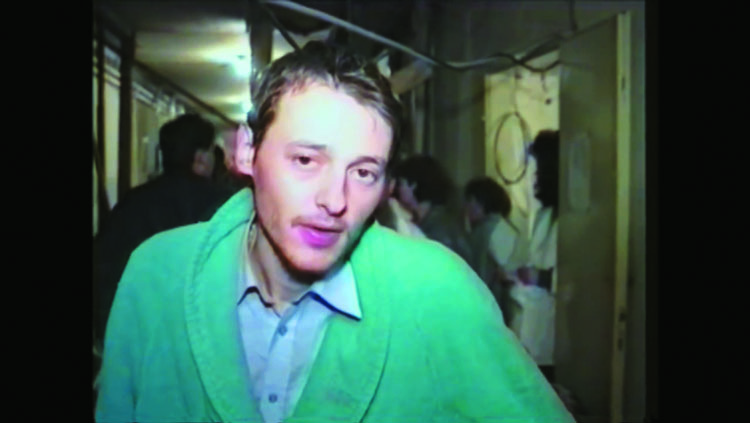
Jean-Michel Nicollier, French volunteer and defender of Vukovar killed at Ovčara
According to the data of the Association at least eight international volunteers fought at Vukovar and three were killed. The best known of them was Jean Michel Nicollier. Although knowing Croatia only from the media in France, the 25-year old headed to Croatia with only one intention in mind – to help those defending Croatia. He fought as an international volunteer at Sajmište in Vukovar, where on 9 November 1991 he was wounded and hospitalised. Following the fall of Vukovar and the entry of Yugoslav Army soldiers and Serbian militia into the Vukovar Hospital, Jean-Michel was abducted alongside other wounded soldiers, tortured and killed at Ovčara, and his remains are missing to this day.
In the basement of the Vukovar Hospital, shortly before his removal and death, he told French reporters: “…I came to Vukovar as a volunteer. It was my decision, for good or for evil. Why, as a volunteer? Because I think the Croatians deserved that help and I chose to fight by their side“.
Author: Vesna Pintarić
Photos by: Tomislav Brandt
